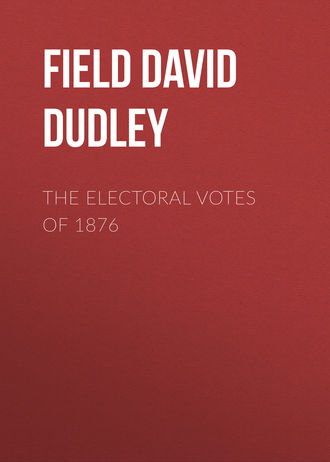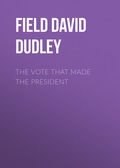
Field David Dudley
The Electoral Votes of 1876
Not to go abroad, however, for illustrations, let us suppose that the General Court convened in the State-House at Boston were to depute the State of New York or the State of Virginia to appoint electors for the State of Massachusetts, no man would be wild enough to pronounce such a deputation valid. It should seem to be certain, for a reason hardly less satisfactory, that the Legislature of Massachusetts could not authorize the Mayor of Boston or the town council of Worcester to appoint her electors; and, if that be so, and the rule is to prevail that, in law, what cannot be done directly cannot be done indirectly, it should follow that the State could not delegate to any other agency the power of appointment. If a body called a returning board be so constituted as that, in certain contingencies, it may depart from the inquiry what votes have been cast, and cast the votes itself, or by any sort of contrivance do the same thing under a different name, or by a roundabout process, it is, to that extent, an unlawful body under the Federal Constitution. Assuming, then, that a returning board has among its functions that of rejecting the votes in particular districts, for the reason either that they were affected by undue influence, or that other voters were led by like influence to refrain from voting, can such a function be valid under the Constitution of the United States? There is no question were of throwing out particular votes for vices inherent in themselves, such as that they were illegible, or were cast by disqualified persons, and the like; but the question is of rejecting the votes of a certain number – say a thousand voters – either because they were unduly influenced, or because another thousand, who might have voted, were, by undue influences, prevented from voting at all.
Whatever may be the law of a State in respect to the choice of its own officers, it seems most reasonable to hold that, under that common Constitution which governs and provides for all the States alike, when the only legitimate inquiry is whom has a particular State appointed, in the manner directed by its Legislature, and the Legislature has directed the appointment to be made by a general election, that is, by the votes of all qualified persons, the only valid office of a returning board must be to ascertain and declare how the State has actually voted, not how it might or would have voted under other circumstances, or, in other words, what is the number of legal votes actually cast; not how many have been unduly influenced, or how many other votes would have been cast in a different state of affairs. I use the expression undue influence, as more comprehensive than riot, bribery, or intimidation, and including other forms of improper influence, such as that of capital over labor. The question should be put in a general form to be correctly answered, because there is nothing in intimidation by violence which would make it a good cause for exclusion, more than that other kind of intimidation, which is social or financial. If, in ascertaining the state of the vote, it be lawful to inquire whether certain voters were frightened by a rifle-club to stay away from the polls, or to vote as the club dictated, it must also be lawful to inquire whether the same number of voters were induced to vote or not to vote by fear that their discounts might be lessened at the village bank, or their employment discontinued at the neighboring factory. I state the proposition, therefore, as one covering all kinds of undue influence. I refrain, however, from going into the question whether this influence was or was not exerted, for I am inquiring into the law as applicable to certain alleged facts, leaving the truth of the allegations to be dealt with by others.
The sole object of all the machinery of elections, the ballots, the ballot-boxes, the canvassers and supervisors of elections, the returns and the returning boards, is, to ascertain the will of the people. Nobody supposes that that will is ascertained to a certainty. An approximation only is possible under our present system. To say nothing of the exclusion of women from an expression of their will, a portion only – though it may be a large portion – of the men express theirs. The sick, the infirm, the absent, say nothing. The registration is always in excess of the vote, and the number of voters falls short of the registration. The reason is patent: many voters are absent at the time of registration, or are otherwise unable or unmindful to register; and when the time of voting arrives many of those who are registered are absent or prevented from attendance. The registration may generally be had on any one of several days, while the voting is to be done on one day. The machinery is imperfect and clumsy at best; but that is not a reason for making it worse, or depriving ourselves of the advantages which it yields, notwithstanding its imperfections. The nearest approach to absolute justice that we can now hope to make is to take the votes of all the voters who offer themselves, and count the votes that are taken. Every scheme of counting out legal votes cast, or counting in votes not cast, must result in confusion, uncertainty, and fraud. No matter how specious the argument may be, it will always mislead, for the reason that it must in its nature substitute conjecture for fact. The vote must, of course, be legal, it must be intelligible; but such a vote when offered must be taken, and when taken counted.
The throwing out of all the votes of certain districts is but another mode of accomplishing the same result as would be effected by the rejection and addition of votes in the cases supposed: for, if there be 10,000 voters in the district, and 5,000 only vote, it can make no difference whether the 5,000 be rejected, or be allowed to remain and the same number be added to the other side.
If the Legislature of a State were to resolve beforehand that no votes should be taken in certain counties or parishes, should we not say that the vote of the remaining counties or parishes would not express the vote of the State? If, in a particular parish, with twenty polling-precincts, ten of the precincts are so disturbed by violence that no votes can be taken, and in the other ten there is no violence, should the votes of the latter be taken as the net result, or should no result be declared because half of the voters are prevented from voting? The practice of a State must be consistent with itself. When the votes of three-fourths of a State are proffered as the vote of the State, the votes of three-fourths of a parish must be received as the vote of the parish. If there was not a "fair and free election" in one-fourth of the parishes, there was not a "fair and free election" in the State; and the just result should be, that, instead of rejecting the votes of those parishes because a portion of the voters were intimidated, the votes of the State should be rejected altogether.
But why, let me ask, should lawful votes in any case be rejected, because other lawful votes might have been given? If they, whose votes were cast, had prevented other votes from being also cast, that might be a reason for punishing the former. But if the former were blameless, where is the justice of punishing them for the faults of others? Suppose a parish with 10,000 persons entitled to vote, and divided into ten precincts. Ordinarily only 8,000 will register and 6,000 vote; the vote of the 6,000 being assumed to be an expression of the will of the 10,000. At a particular election 3,000 persons vote in five of the precincts. In the other five only 1,000 vote, there being disturbances on or before the day of election. It is alleged that the last 1,000 votes should not be counted. Why not? Because, say the objectors, 2,000 persons did not vote, and it is to be presumed, first, that they were kept from the polls by fear, and, next, that if they had voted at all, they would have outvoted the 1,000. Are not these the merest assumptions? You cannot get the truth without knowing the motives which kept voters away, and how they would have voted if they had come. You cannot know either with certainty, without examining all the voters. And the theory which would lead you to call them for examination should also lead you to call all who in other cases have not voted, to ask why they kept away, and how they would have voted if they had been present. The argument which justifies the exclusion in case of intimidation would include all cases of absence and of inquiry into what would have been the result if there had been no absence. Intimidation is one kind of undue influence; expectation of benefit is another; fear of social ostracism is another: will you go into them? There seems no middle course between excluding all inquiry into the causes of absence and the probable votes of the absent, and allowing it in every instance where persons entitled to vote have not voted. To my thinking, a certificate given after the elimination of votes, in the manner indicated, certifying that the electors have been chosen by the people of the State, is a palpable falsehood. It should have certified that they had been chosen by the people of so many parishes or counties, out of the whole number.



